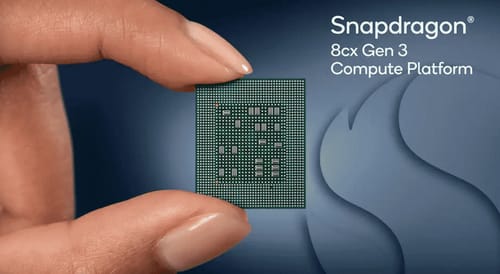 |
| Find out more about the performance of Qualcomm's new laptop processor |
Qualcomm hopes to ship laptop processors that can rival Apple M processors by 2023. That's why it has announced its latest laptop processor under the name of the third generation Snapdragon 8cx 7c+.
The new processor is designed for Windows Chromebook laptops and delivers the best performance for those mobile devices.
The third generation Snapdragon 8cX processor is said to provide better battery performance for laptops with an additional use of up to 25 hours, depending on the specifications of the computer.
It is also 85% higher than last year for general processing and 60% higher than last year for graphics processing.
Key features of the new Qualcomm processor
The third generation Snapdragon 8cx processor supports 5G wireless connectivity via the Qualcomm X65 chip, which delivers Wi-Fi connection speeds of up to 10Gbps or 3.6Gbps over WiFi 6E.
The new segment also focuses on artificial intelligence and aims to improve computer capabilities in relation to artificial intelligence.
The company uses a new artificial intelligence engine in the chip with a performance of more than 29 teraflops. The output is three times what it was in previous years.
The third-generation Snapdragon 8cx processor also supports Windows 11 through a TPM chip to protect processor and system data.
The processor can record 4K videos and use artificial intelligence to remove noise and isolate it from the background, which improves the performance of the processor in group video chats.
The performance of the Snapdragon 7c + processor is slightly lower than that of its professional brother, with a performance increase of 60% compared to last year.
The processor also supports direct connection to the fifth generation network, but the speed is slightly slower than that of the professional brother.
Compared to Apple chips and other laptop chips, Qualcomm's performance hasn't improved much. Although Nuvia was only acquired recently this year, it is still a bit behind its competition.
Next year, we could see a new chip from Qualcomm that could rival the Apple chip used in laptops. However, the main problem remains the compatibility of Windows applications with ARM chips. Microsoft still cares about this compatibility and is working hard to fix any issues that may arise.
